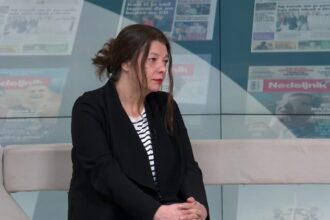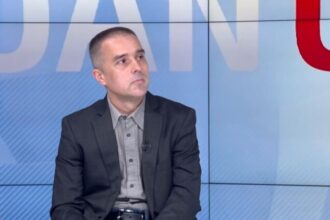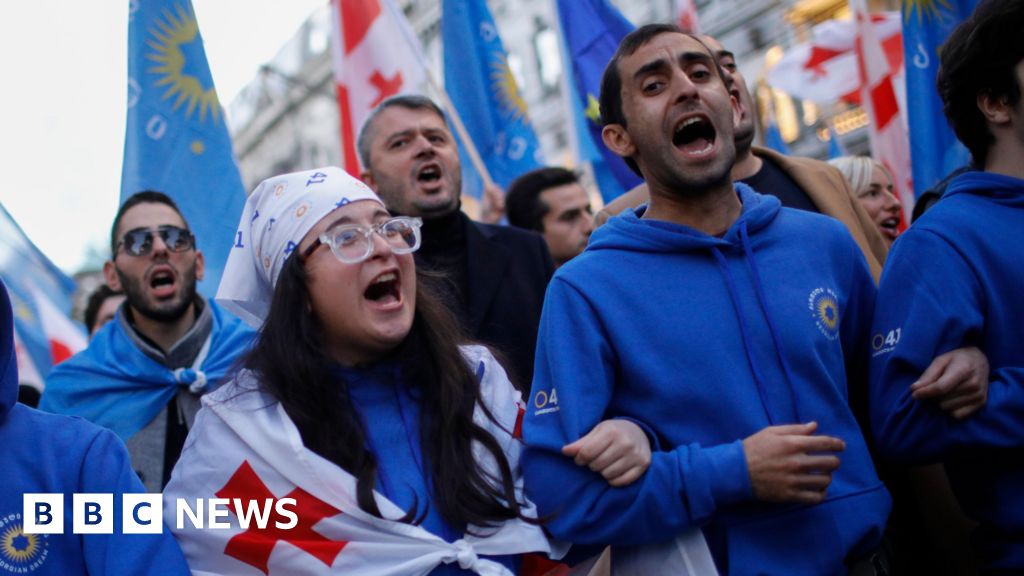On Saturday, Georgians will go to the polls to decide if they want to end 12 years under a more authoritarian government. This is a decisive vote for their bid to join the European Union.
Some people describe this election as being the most important vote since the Georgians supported independence from the Soviet Union back in 1991.
Four opposition groups believe that they can combine their forces to remove the ruling Georgian Dream Party from power and revive Georgia’s EU process.
In this South Caucasus country, which fought with Russia for five days in 2008, four out of five voters support joining the EU.
Georgia was only made a candidate by the EU in December last year. It was only last December that the EU made Georgia a candidate.
Around 3.5 million Georgians will be able to vote between 04.00GMT and 16:00GMT. The opposition calls this a choice between Europe and Russia, while the government frames it as a question of peace or war.
Georgian Dream is seeking a fourth term in power under the leadership of Bidzina Ilvanishvili, Georgia’s richest person.
Ivanishvili has promised to ban the United National Movement if his party wins a large enough majority. This is because of the actions the party took when it was in power.
Georgian Dream (GD) is expected to win around a third of votes according to opinion surveys, but they are generally regarded as unreliable. To unseat GD, all four main opposition groups must win at least 5% of the votes to qualify for 150 seats in the parliament.
Salome Zourabichvili, a pro-Western president, has backed the opposition and declared that the election would end “one-party rule” in Georgia.
She has agreed on a charter with four of the biggest groups, so that if the big groups win, a technocrat government will fill the immediate void. It would then reverse any laws that were deemed harmful to Georgia’s EU path and call for snap elections.
Tina Bokuchava is the chairperson of the largest opposition party, United National Movement. She insists that all credible polls show the opposition in the lead.
Georgian Dream’s message that a victory for the opposition would trigger war with Russia has proven effective outside of the big cities.
On party billboards throughout the country, split images of devastated cities in Ukraine are shown alongside peaceful Georgia with the slogan “No to war!” Choose peace.”
Georgian Dream, the party that GD accuses of being the opposition, will keep peace with Russia, which fought with Georgia in 2008, and still occupies 20 percent of its territory.
The slogans of the governing party have attracted some public support, even though the claim is unfounded.
“I don’t love Georgian Dream but I hate [opposition United] National Movement. At least we’ll be at Peace.” Another woman, Lali, aged 68, told the BBC that while the opposition may bring Europe closer, they will also bring war.
The International Society for Fair Elections and Democracy criticized GD’s campaign for the election hours before polls opened.
The report cited threats, intimidation and instances of voter ID cards being seized. It also pointed out Russian-sponsored disinformation campaigns and domestic campaigns.
The BBC spoke with Aleksandre in a village to the north-west of capital who said he was threatened by a local GD member that he would lose his job if he didn’t sign up to vote Georgian Dream. “I’m a little scared of his threats but what can i do?”
Georgian Dream claims that it has made the elections more transparent with a new electronic voting system.
“For the past 12 years, we have had an opposition that constantly questions the legitimacy and authority of Georgia’s Government. Maka Bochorishvili is the GD’s head for the EU integration committee in parliament.
Bochorishvili said: “All the speculation about forcing people into voting for certain political parties is nonsense. At the end of it all, you are the only one who votes and electronic machines count that vote.”
Critics claim that the changes were made too quickly and that there is a genuine concern that the vote may not be secret in certain places.
Vano Chkhikvadze, who works at the Civil Society Foundation in Tbilisi’s centre, points out graffiti painted in red on the walls and the ground outside his office.
He claims that after the “foreign influences” law was passed in the summer, and in the face mass protests in Tbilisi’s centre and other large cities, Prime Minister Irakli Kobakhidze personally labeled him as a traitor to the state.
“We received phone calls at night.” Our kids even were getting phone calls. They were threatened.”
Before the vote, the EU warned Georgian Dream that its actions “signal an authoritarian shift”.
The loser of Saturday’s election is unlikely to accept defeat without a fight.
Read More @ www.bbc.com




